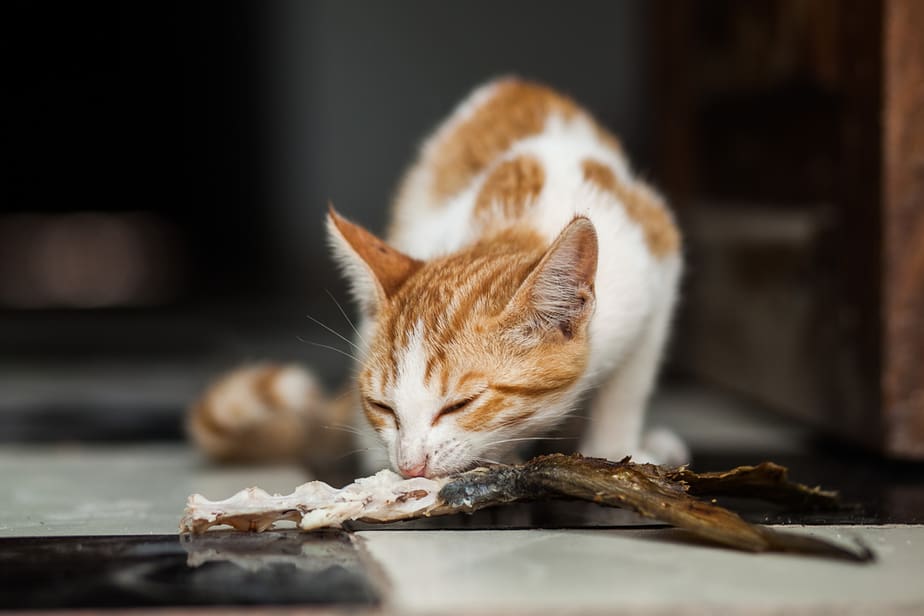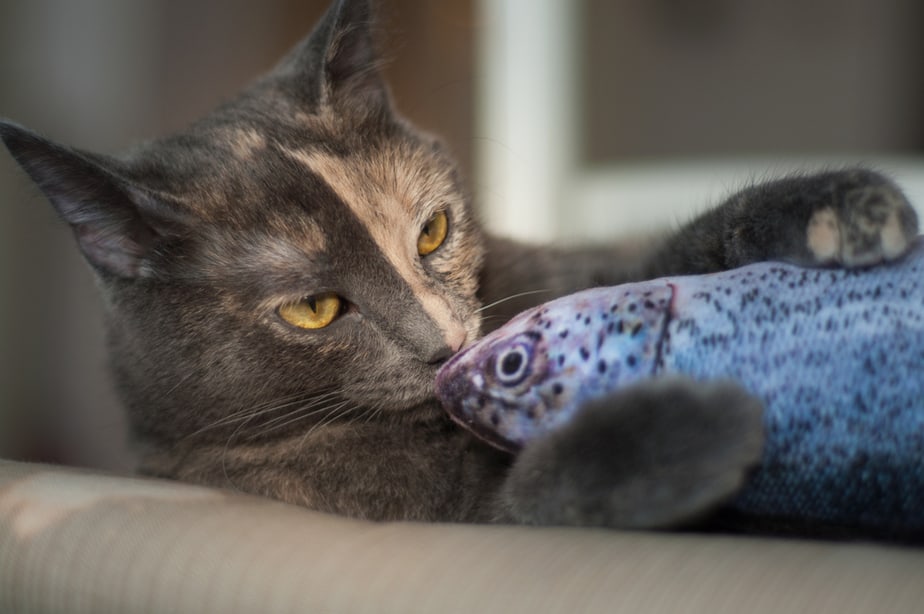Fish is one of the healthiest kinds of seafood out there. Humans can benefit from this food, just like cats. But, can cats eat fish bones? We know humans can’t and we would probably choke if we tried.
However, cats are built differently than us. When we think of cats as our pets, we often remember that there was a time when they were wild animals. Undomesticated cats have to find their way around to survive.
When we feed fish to our fluffs, we make sure to strip it off bones. But what about those kitties in the wild, can they eat fish bones? Cats are usually picky eaters, what would make them like this part of fish?
Can cats eat fish bones safely?
The first thought that probably comes to your mind is choking. Yes, fish bones are a choking hazard to your four-legged companion. These bones are pointy and sharp. There have been many reports of humans choking on fish bones.
Sounds like fishy revenge, right? These tiny bones can snap in half and cut your cat’s mouth, gums, and throat. When feeding fish bones to cats, make sure you’re there to supervise.
Besides getting stuck in her throat, fish bones can travel further down and cause even more trouble. If somehow your cat manages to swallow whole fish bones without chewing them through, it could result in blockages.
These are extremely dangerous situations your cat can find herself in. Blockages require surgery so the fishbone is safely removed.
Apart from blockages, swallowed bone can cause damage to organs. This would be a cat owner’s nightmare. Besides your cat’s suffering, we’re talking huge vet bills.
Your cat’s safety should be a priority and therefore, choose wisely. Fishbones might not sound so good now, right?
Raw or cooked fish bones?

If you really want to feed your cat some fish bones, make sure you skip the cooking part. This is because raw fish bones are softer than cooked ones. The reason behind this is that cooked fish bones become oxidized and therefore, harder.
While cooked, fish bones are exposed to high levels of oxygen. Raw fish bones go through less exposure and are therefore less likely to snap in half.
The process of cooking makes breaking fishbones in half easier, whereas raw fish bones have a more elastic-like texture. They can bend more without breaking that easily. This leaves room for cats to chew down on them and crush them properly.
How and when to feed fish bones?
“Can cats eat fish bones” probably isn’t the only thought on your mind. You also want to know how to safely give them to your feline.
I fully understand your concern since fishbones can be quite tricky. They are a choking hazard and you must be cautious when feeding your cat these parts of fish. If you want to introduce fish bones to your cat’s diet, make sure you take baby steps.
Start with feeding small fish. The smaller the fish, the smaller the bones. Therefore, it’s easier for your pet to adjust to the bones in the fish. Regardless, every meal that includes choking hazards like these should be supervised.
Although fish is a great source of nutrients, overconsumption thereof isn’t recommended for cats. Your childhood memories might take you back to some cartoons of cats eating fish occasionally.
However, this isn’t the case in real life. Felines are carnivores and they usually like fish. But, it’s uncommon that a wild cat would go out fishing, right? After all, felines are led by their instincts.
Raw bones, but cooked meat

A large intake of fish can lead to mercury poisoning. This is a build-up of heavy metal that can be poisonous to felines. Because of this potential risk, it’s best if you avoid feeding large portions or large fish to your cat.
Fish is recommended as an occasional snack and that way, your cat can benefit from this seafood. Raw bones are better than cooked ones, but what about meat? Cooked fish is preferred over raw.
The reason behind this is that raw fish can be a source of disease. These diseases are carried by parasites that live in raw fish. These can be eliminated through the process of freezing or cooking.
Therefore, it’s important to properly cook fish for your cat so the temperature kills off any pathogens.
Cooked fish, a healthy treat
What’s better than fish bones for cats is fish meat. Fish is a great source of nourishment for felines as it contains an array of vitamins and minerals. Cooked fish can benefit your cat’s health, but should still be given only as a snack.
Vitamins found in fish are essential to your feline’s health. For example, vitamin A helps with her eyesight. The lack of this vitamin can result in poor night vision, which is bad news for cats because they are nocturnal animals.
Fish is also a great source of vitamin D, which cats have a hard time getting from the sun. This vitamin is crucial for her bones, teeth, and claws. Without this supplement, your kitten might experience joint issues.
Other health supplements like niacin and vitamin B12 are crucial for your cat’s health. They keep her going and overall, fuel her immune system.
Minerals also play an important role in keeping your feline healthy. For instance, iron takes care of your pet’s red blood cells and helps prevent anemia. Other minerals like potassium and selenium are required for muscle contraction and efficient nervous system function.
Besides, fish is rich in omega-3 fatty acids which help keep your fluffball maintain a healthy, shiny, thick coat. Next to that, her skin is healthier and will never be dry again.

Fish allergies
Unfortunately, cats can have allergies, just like humans do. And fish is no exception.
Cats can be born with this allergy or develop it as they get older. Some of the most common signs of fish allergy in cats are skin rashes and hair loss.
If you notice any change in your cat after eating fish, make sure to visit your vet. Other than allergies, your cat may show signs of fish intolerance. This might seem similar to an allergy, but the symptoms are what give it away.
These often include vomiting and diarrhea. If your pet is showing any signs of gastrointestinal distress, it’s best if you let go of the fish.
To sum up
Cats can eat fish bones, but they really shouldn’t. Besides, the nutritional value of fish bones doesn’t even start to resemble that of fish meat. Cooked fish is a great source of essential health supplements like vitamins, minerals, and fatty acids.
Raw fish can carry certain parasites that can exacerbate the problem. Therefore, this potential disease-carrying food is recommended only in cooked form. If you cook fish properly, high temperatures will kill off any pathogens and make your cat’s meal safe.
Also, raw fish bones are safer for your cat than cooked ones. Interesting, right? The reason behind this is that cooked fish bones are highly oxidized. This process makes cooked fish bones more prone to snap.
All in all, fish bones are a choking hazard for your cat and are not recommended. If you insist, smaller fish is the way to go.

